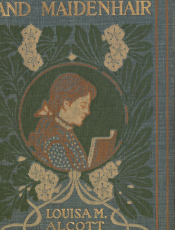“denis,” said lord clancarty laughing, “in five minutes they will be here and in ten i may be dead.”
“divil a bit, my lord,” said denis hopefully, “unless you are kilt intirely.”
but there was a strange look in the faithful irishman’s eyes, a look of mute suffering. lord clancarty slipped a ring off his finger and gave it to him.
“denis,” he said, in an even voice, quiet and cheerful, “if i fall, take that to lady clancarty and tell her that she is free.”
“yes, my lord,” replied denis, in a dull tone, not looking up.
“even if i do not fall, you will take it to her with that message,” continued the earl, looking across the meadow at the approaching figures of his opponent and their seconds and, perhaps, his thoughts dwelt on that morning when lady betty put the swords aside. “we[pg 166] will leave here to-morrow, denis, or—” he shrugged his shoulders, “there is little money left.”
“faix, we’ll have to see th’ jews again, me lord,” said the man dolefully; “they’re afther bein’ me most familiar friends, the jewels!”
clancarty laughed.
a moment later he was bowing with ceremonious courtesy to lord savile and mr. benham. young mackie came up, too, bringing a fourth person.
“i brought a surgeon, gentlemen,” he said half apologetically; “dr. radcliffe, my lord savile and—mr. trevor.”
dr. radcliffe, a large man wearing a rich but old-fashioned dress and a huge periwig, bowed gravely. he had a large practice and was famous for a freedom of speech that had once gone so far as to offend king william.
“i have to thank you, gentlemen, for furnishing me with patients,” he remarked dryly; “let me beg you not to be too thorough.”
“’tis to be to the finish, doctor,” said clancarty coolly, that dangerous smile on his lips.
“a devilish poor plan,” said the doctor, with a shrug; “it will take more than my skill to resuscitate a corpse.”
[pg 167]“we shall not expect a miracle—even from the great dr. radcliffe,” replied clancarty.
mr. benham and young mackie were measuring the ground. denis, in the meantime, turned his face away and looked toward the setting sun; it may be that he was wishing for the shoes he wore at boyne, but it is not recorded. the clouds overhead were red and the level meadows bathed in the slanting rays of light; long shadows fell across the scene; a bird sang in the grove of limes.
the two men stepped into the open, stripped of coats and waistcoats, their white shirts showing vividly against the green background. lord savile was flushed, but clancarty’s face was singularly serene. the signal was given; their weapons flashed, and there was the sudden ring of steel on steel.
ah, ’twas a wonderful duel; afterwards, men spoke of it as a kind of triumph in the art of duelling, and dr. radcliffe described it to the princess anne and the duke of marlborough. clancarty was an irishman and therefore a born fighter, though the englishmen of that day thought all irishmen cowards because the poor, barefoot peasants ran before the trained battalions of the english and dutch. moreover, the young earl had served[pg 168] a long apprenticeship on the continent; and in france duelling was the breath of men’s nostrils. clancarty fought that day recklessly and beautifully; he was lithe and graceful as a panther, with a wrist like steel and an eye that never faltered, and he had met no mean antagonist; my lord savile was counted one of the best swordsmen in the guards, and hating his opponent he fought with fury.
steel ground on steel and the sparks flew, thrust and parry, point and blade, stroke on stroke. the others watched in breathless admiration; they even forgot their individual interest in the struggle and stood gaping like schoolboys. both men were tired, yet both played on, evenly matched, relentless and reckless. there was a sudden thrust over savile’s guard and then, in an instant, lord clancarty’s sword snapped at the hilt, just as savile’s crossed it and passed into his breast. it was over in a moment, and he lay full length on the turf and the blood was flowing from a cut in his antagonist’s neck.
“oh, my lord, my own dear lord!” wailed denis, falling on his knees, and even lord savile’s face was white as chalk.
in the dimly lighted hall of the inn that[pg 169] night, denis, with a lined, drawn face, white as a dead man’s, laid something in lady betty’s hand.
“me lord’s greetings to me lady,” he said in a strained voice; “i was to give ye that an’ say, ‘ye are quite free’!”
lady betty stared at him wildly. she read a message of calamity in his face.
“what is it? what has happened?” she cried.
but the irishman only gave her one look of deep reproach and plunged down the stairs into the hubbub of the court.
clancarty’s ring and “you are free”!
she swayed so that alice lynn, who came running toward her, caught her in her arms and almost carried her to her room.
